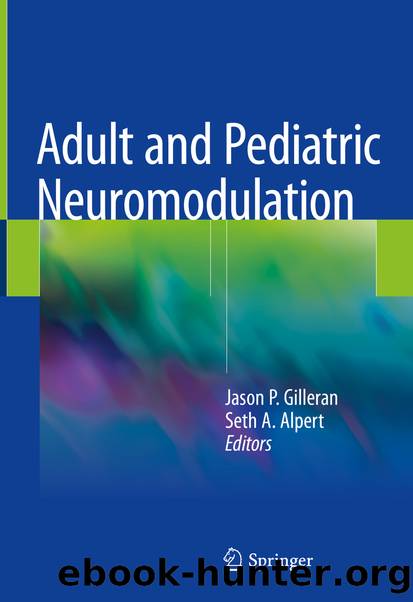Adult and Pediatric Neuromodulation by Jason P. Gilleran & Seth A. Alpert

Author:Jason P. Gilleran & Seth A. Alpert
Language: eng
Format: epub
Publisher: Springer International Publishing, Cham
Neuromodulation
Fecal incontinence refractory to dietary modification, biofeedback, and antidiarrheal medications often warrants more aggressive management. Other surgical procedures briefly outlined above have been shown to lack durability and are fraught with high complication rates. While overlapping sphincteroplasty addresses the underlying mechanical defect, it has not shown long-term durability. Artificial bowel sphincter and dynamic graciloplasty are complex procedures with high complication rates. Given the anecdotal reports in improvement in fecal incontinence in patients who underwent placement of a sacral nerve stimulator for the indication of urinary incontinence, investigation into the efficacy in stand-alone fecal incontinence was undertaken. The results were positive with an overall 80% success rate in patients with a neurologically intact sacral plexus and an anatomically intact anal sphincter and rectum. Unfortunately, until the early 2000s there were no randomized trials to substantiate the efficacy of sacral neuromodulation for fecal incontinence. In 2005, Le Roi et al. published the first double-blind multicenter European trial examining the effectiveness of sacral nerve stimulation in fecally incontinent patients. Thirty-four patients underwent sacral nerve stimulation for fecal incontinence. After implantation, 27 of 34 patients were randomized in a double-blind crossover design to stimulation ON or OFF for 1-month periods. While still blinded, the patients chose the period of stimulation that they had preferred. The mode of stimulation corresponding to the selected period was continued for 3 months. Results indicated a statistically significant improvement in the reduction of episodes of fecal incontinence when the patient’s device was set to ON. The ability to postpone defecation, anal sphincter function, the score for symptom severity, and quality of life were improved. The authors concluded that given the improvements in the crossover period these results were not related to placebo effect [35]. Following the approval of sacral nerve stimulation for fecal incontinence in Europe, investigations into the morbidity and quality of life during long-term stimulation were undertaken. Hetzer et al. conducted a prospective trial aimed at this between 2001 and 2005. Forty-four patients were assessed with the main outcome measures being morbidity, improvements in the stool diary, Wexner Score for fecal incontinence, Hanley Score for urinary incontinence, and quality of life questionnaires. A permanent stimulator was implanted in 37 patients (84%). Eight patients (22%) experienced complications with reimplantation successful in five of those patients. Wexner Scores decreased from a median of 16 points preoperatively (range, 6–20), to a median of five points postoperatively (range, 0–13; P < 0.001). The median number of involuntary stool losses and urge defecations also decreased significantly. Significant improvement in quality of life was found in both generic and incontinence-specific questionnaires (P < 0.05). The success rate of the sacral nerve stimulator (SNS) in this study overall was 77 and 92% in patients with permanent implantation. Patients who underwent a placement of a SNS reported significant improvement in quality of life from both a physical and psychological standpoint with low overall morbidity [35]. Despite these encouraging results, the SNS (InterStim ® device) remained unapproved by the FDA for fecal incontinence until 2011, following publication of a landmark study performed by Mellgren et al.
Download
This site does not store any files on its server. We only index and link to content provided by other sites. Please contact the content providers to delete copyright contents if any and email us, we'll remove relevant links or contents immediately.
| Anesthesiology | Colon & Rectal |
| General Surgery | Laparoscopic & Robotic |
| Neurosurgery | Ophthalmology |
| Oral & Maxillofacial | Orthopedics |
| Otolaryngology | Plastic |
| Thoracic & Vascular | Transplants |
| Trauma |
When Breath Becomes Air by Paul Kalanithi(7261)
Why We Sleep: Unlocking the Power of Sleep and Dreams by Matthew Walker(5640)
Paper Towns by Green John(4169)
The Immortal Life of Henrietta Lacks by Rebecca Skloot(3826)
The Sports Rules Book by Human Kinetics(3587)
Dynamic Alignment Through Imagery by Eric Franklin(3488)
ACSM's Complete Guide to Fitness & Health by ACSM(3467)
Kaplan MCAT Organic Chemistry Review: Created for MCAT 2015 (Kaplan Test Prep) by Kaplan(3422)
Introduction to Kinesiology by Shirl J. Hoffman(3299)
Livewired by David Eagleman(3121)
The River of Consciousness by Oliver Sacks(2992)
Alchemy and Alchemists by C. J. S. Thompson(2911)
The Death of the Heart by Elizabeth Bowen(2901)
Descartes' Error by Antonio Damasio(2731)
Bad Pharma by Ben Goldacre(2727)
Kaplan MCAT Behavioral Sciences Review: Created for MCAT 2015 (Kaplan Test Prep) by Kaplan(2491)
The Gene: An Intimate History by Siddhartha Mukherjee(2491)
The Fate of Rome: Climate, Disease, and the End of an Empire (The Princeton History of the Ancient World) by Kyle Harper(2435)
The Emperor of All Maladies: A Biography of Cancer by Siddhartha Mukherjee(2430)
